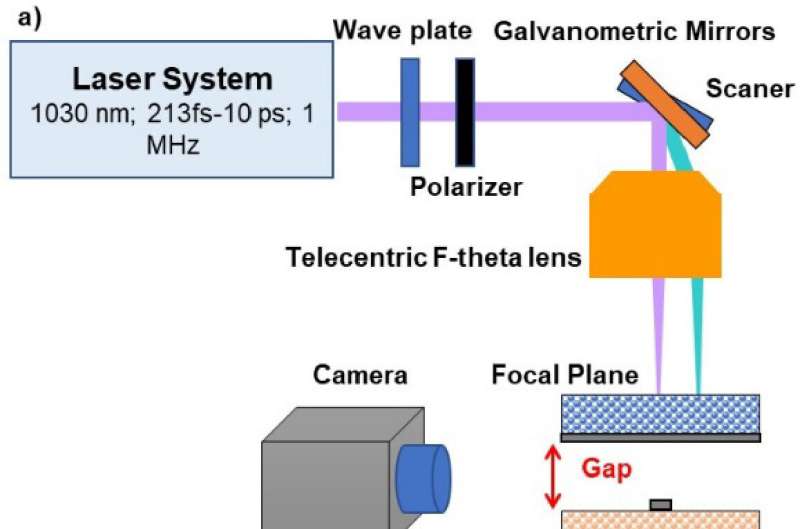Researchers achieve first-ever printing of materials using laser techniques that change with voltage

Researchers from the Holography and Optical Processing Group (GHPO) have succeeded in printing tunable materials for the first time using high-precision laser techniques. This development has been published in the journal Optics Express and demonstrates that it is possible to print a polymer doped with liquid crystal, which opens the door to using this fast, high-precision and environmentally friendly technique in the manufacture of tunable devices.
As explained by the head of this research work, Professor Daniel Puerto, the development of this technology makes it possible to manufacture lenses with a material that changes its properties when an electrical voltage is applied to it, which opens up a wide range of possibilities for use in devices, microscopes or optical microdevices.
This work is the result of a collaboration led by the UA group, with the participation of researchers Sergi Gallego, Manuel Ortuño, Andrés Márquez, Jorge Francés, Inmaculada Pascual and Augusto Beléndez. Also, researchers Catalin Constantinescu and Patricia Alloncle from the LP3 laboratory of the Center National de la Recherche Scientifique (CNRS, France) took part in this work, as well as researcher Camilo Florian from Princeton University (U.S.).
The use of materials whose optical properties are tunable is widespread in many communications devices to enable optical switching or multiplexing. The manufacturing of these devices is a time-consuming and cost-intensive process and, therefore, in the last twenty years, with the development of systems using ultra-short pulse lasers (10-12 to 10-15 seconds), laser processing techniques are being used to produce faster and more environmentally sustainable equipment.
The experience of the Holography and Optical Processing Group—led by lecturers Augusto Beléndez and Inmaculada Pascual—has opened up a new line of research in the manufacture of tunable devices such as lenses and waveguides manufactured by techniques such as laser printing.
In this sense, Daniel Puerto stresses that the use of polymer-based materials allows their use in technologies that are already being developed and that aim to make devices such as mobiles, tablets, etc. foldable. For this purpose, the use of flexible materials such as polymers are essential.
According to the researcher, we have the perfect element for the development of the technology of the future If we want them to be tunable. The use of laser techniques for manufacturing optical and electronic devices is widespread, but it has not been possible to print polymers with liquid crystals so far, which opens a wide range of possibilities for the use of this technique.
More information:
Daniel Puerto et al, Liquid crystal doped photopolymer micro-droplets printed by a simple and clean laser-induced forward transfer process, Optics Express (2023). DOI: 10.1364/OE.488859
Citation:
Researchers achieve first-ever printing of materials using laser techniques that change with voltage (2023, June 14)
retrieved 15 June 2023
from https://phys.org/news/2023-06-first-ever-materials-laser-techniques-voltage.html
This document is subject to copyright. Apart from any fair dealing for the purpose of private study or research, no
part may be reproduced without the written permission. The content is provided for information purposes only.
For all the latest Science News Click Here
For the latest news and updates, follow us on Google News.

